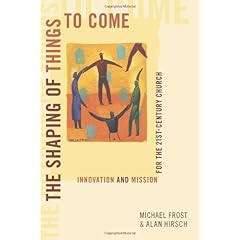This one's for my mate Shane F.
Why Men Hate Going to Church by David Murrow.

It was the title of this book that first grabbed me. Here was something, I thought, I will definitely be able to relate to. Unfortunately, the title was almost as good as it got!
Perhaps I'm being a little hard. David Murrow has tackled a controversial and timely topic in this book. While overall the book reminded me of a late night infomercial, it did manage to get me thinking a little harder about the problems we have in our own church community in engaging men.
There's no doubt Murrow has a point. He has recognised the lack of male presence in many traditional congregations and asked "why?". But his view of church and ministry is, unfortunately, quite narrow, and so too are his solutions. He holds up the American mega-congregation as the prime example of successful church, he encourages the traditional top-down approach to ministry where the pastor is "the man" and he paints a picture of true masculinity that includes pick-up trucks, the outdoors, and killing things.
Now, the first two things in the above list - the mega-church and the CEO pastor - are pet hates of mine, but the third I can relate to. I am an outdoorsy kind of bloke, I owned a 4 wheel drive pick-up (or ute as they are known in Oz) for many years and still own and use a 4 wheel drive wagon. I have spent my fair share of time hunting poor defenseless animals (and enjoyed it!). But I also know that there are vast numbers of blokes out there who don't fit this picture of masculinity, especially in urban centres populated with New-Age Sensitive types and young professionals. We need to be ready to be "all things, to all men", as Paul says it in 1 Corinthians 9:9-22, by knowing our community and its culture, and knowing that masculine culture in general is nowhere near as easily defined as Murrow makes it out to be.
On the other hand, I think most men would agree, there is a part of the masculine spirit that seeks adventure and danger and Murrow does try to capture this. He also aptly addresses the descent into femininity of the modern church - a place of flowers, feminine motifs and romantic love songs to Jesus. Murrow says men need to be able to; "Imagine Christ as [their] Commander, Coach or Scout, not [their] Boyfriend". He recounts the experiences of "Tony", attending his first men's ministry event:
Tony was asked to introduce himself and share about his life. Next, he was paired with a stranger and asked to share one of his deepest fears. Then everyone was asked to share a prayer need or a praise report. The men read from the Bible, taking turns around the circle. Finally, the men stood in a circle and held hands for what seemed like hours, while one by one they bared their souls to God. One man was quietly weeping. The guy next to Tony prayed for ten minutes straight, and his palms were sweaty. Once the meeting was over, Tony didn't stay for cookies. He hasn't been back.
Murrow rightly points out the need for change in these areas of ministry, if we are to be real when it comes to getting men involved with Jesus Christ. Where he goes wrong is in seeing the masculinising of traditional ways of doing church as the answer.
We can change the way things look on a Sunday, we can get all bloke-friendly, but at the end of the day the problem lies in the image the church has in general and the methods it uses to try and draw people to it - the "build it and they will come" mentality. It's going to take more than just ditching the
doilies or holding special events for men that focus on masculine pursuits to solve the real problems.
Murrow's continual use of generalisations about what "men like" and "dislike" are also annoying and a little condescending and his regular deference to consumer-driven models of church, frustrating.
If you are really interested in captivating men and leading them into the adventure of following Jesus Christ, John Eldridge's
Wild at Heart is a better starting point. It doesn't offer all the quick fix solutions of
Why Men Hate Going to Church but it paints a far broader picture of the masculine spirit. Even so, Murrow has touched a nerve in contemporary church culture and, if nothing else, has opened the door to deeper discussion on the way men's ministry is approached by the local church.
I give it 2 out of 5 pick-up trucks!
Murrow has a website called
Church for Men.

















